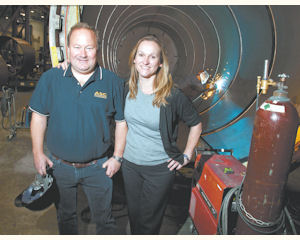Valencia-based ASC Process Systems, one of the world’s largest suppliers of autoclaves, has innovated its way to the top of the industry. From its beginnings in the east San Fernando Valley, ASC has grown into a $46.9 million company with about 40 percent of its business done overseas. The company’s software for the systems controlling the autoclaves — cylinder-shaped high-pressure and high-temperature ovens used to cook composite materials for aircraft parts — has become the industry standard. ASC has maintained a competitive edge by staying ahead of technology, said Dave Mason, who operates the company with his wife, Gudrun. “If you are not going to innovate, you will be taken over by someone who does,” Mason said. Aerospace companies make up about 85 percent of ASC’s client list. Prior to the recession, construction companies had bought autoclaves for curing concrete. Specialized businesses, such as building masts for ships and flat screen televisions, also have use for the equipment. There are only a few autoclave manufacturers in the world, and customers say ASC is among the best. Fralock, a Valencia custom die cut and fabricated parts manufacturer, replaced its autoclave vendor with ASC six years ago, because the company quickly responded to its calls for repairs. “They promised to give 24-hour service and they have proved true to their word,” said Eric Breazell, the maintenance manager. New opportunity Dave Mason and business partner John Preiss founded ASC together in 1987. (Mason and Preiss met while working at the Thermal Equipment Corp., another autoclave maker where Mason was an engineer and Preiss in operations.) ASC initially focused on servicing and modernizing autoclaves and was located in Sun Valley, close to aircraft manufacturer Lockheed Martin, which at the time had a strong presence in Burbank. Increasingly, though, the company got orders to build autoclaves. And when Preiss retired from ASC in 1999, the company moved to Chatsworth and started its manufacturing operations. “I was like, ‘If we’re going to build, let’s build and not dabble on the edges,’” Mason said. Mason set about to change how the equipment was seen in the industry. For years, it was seen as pricey custom equipment only available to top name military and commercial aircraft makers such as Boeing and Lockheed, he said. ASC redesigned its equipment and made adjustments to its supply chain to lower the costs of the equipment, granting aerospace suppliers an affordable entry point. More specifically, Mason made installed heating and cooling systems in the floor rather than at the rear of the cylinder and reduced the footprint by 30 percent. Buying parts directly from manufacturers, rather than distributors, also contributed to a price break. However, the company’s primary challenge was gaining acceptance in the aerospace industry, which had been used to doing things the old way for so long, he said. “We had to push hard to get aerospace (companies) to buy into the design concept,” Mason said. Sales took off for ASC as aerospace companies purchased more of its equipment while the competition stuck with its tried and true methods. YEAR FOUNDED: 1987 Revenues 2009: $20.3 million Revenues 2011: $46.9 million (preliminary) Employees 2011: 220 Industry leader By 2004, the company purchased a 40,000-square-foot building in Sylmar. At that same time, Gudrun Mason’s role expanded at ASC. Gudrun, who had been the corporate secretary since the late 1990s and vice president in 2003, began managing the finances and human resources duties. This left Dave Mason time to work on the control system software and the autoclaves, said Ken Ray, an accountant with Kirsch Kohn & Bridge LLP, who has handled ASC’s finances since 1991. “They make a really good team in business,” Ray said. The control system manages the temperature and pressure of cooking composite materials. If it doesn’t work properly, then it makes no difference how well built an autoclave is – it won’t serve the customer’s needs, Mason said. The CPC software package has been offered by ASC since 1989 and is used on about 1,800 autoclaves. Among those are the four recently installed autoclaves at ATK Aerospace Structures in Utah. The ASC control system and software beats out the competition by a long shot for its versatility and ease of use, said Ty Vorwaller, a mechanical engineer with ATK. “They provide enough capability that we can maintain our claves properly and that minimizes down time,” Vorwaller said. In late 2010, the company moved to its current location in Valencia. ASC’s 100,000-square-foot production facility can accommodate 15 overhead cranes, which are used to move the massive autoclaves. ASC built the largest autoclave by volume with a 30-foot interior for the South Carolina manufacturing facility of the Boeing 787 Dreamliner fuselage. The Masons paid $9 millionfor the facility and invested another $2.9 million in crane equipment and other improvements. The building’s design centers on the manufacturing activity that takes place on the shop floor. The administrative and engineering offices, employee break room and recessed alcove are located on the second floor and feature windows overlooking the manufacturing area. “Everybody can see what is going on out there,” Gudrun Mason said. Now the company’s working on its global visibility. Overseas customers are becoming acquainted with ASC as more sales take place there. The company has subsidiaries in the United Kingdom and China. Last month, Mason sent installation teams to work sites in China and the Czech Republic. Regardless of where the autoclaves are used, Dave Mason tells his workers to build to meet his “20 year rule.” These aren’t toasters or computers or television sets that are easily disposed of but equipment with a lengthy life. “Hundreds and hundreds of people will see our product,” Dave Mason said.
